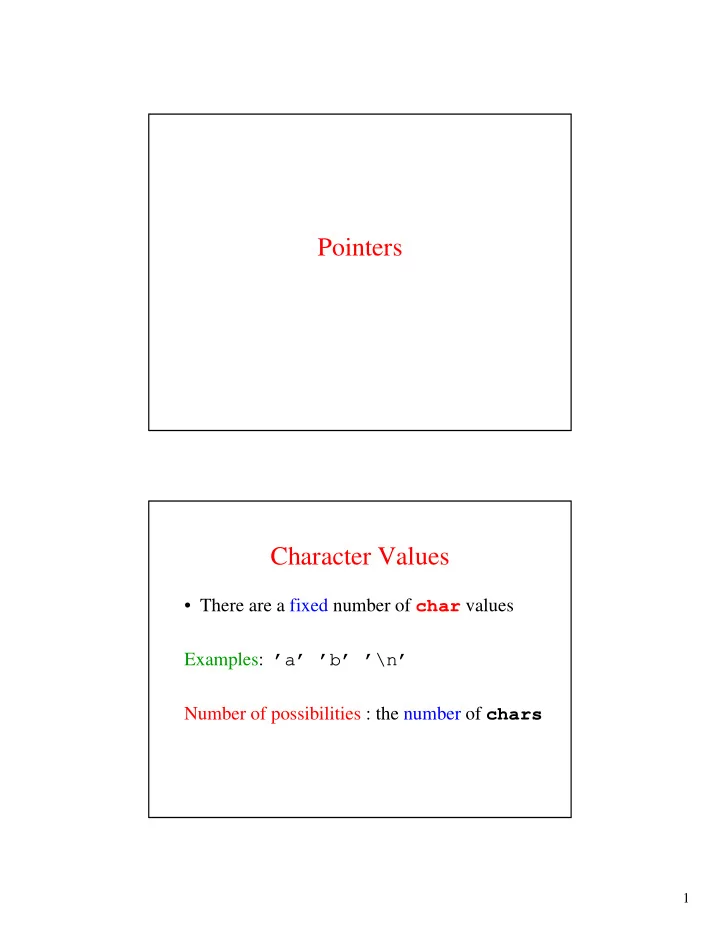

Pointers Character Values • There are a fixed number of char values Examples: ’a’ ’b’ ’\n’ Number of possibilities : the number of chars 1
A char Variable Pointer Values There are a fixed number of pointer values Assume a 32 bit address space Examples : 00000000, FACC432F, ... One different pointer value per address... 2
Pointer Values(Constants) The & operator & is the address operator • Provides a pointer constant to any named location • Example: &aChar • Use %p to print an address 3
Printing Pointers What does it print ? 142300 142301 Pointers : 4 byte Integers Address of a variable is: Address of the first byte of the variable 4
Pointer Variables Possible to define variables holding pointers Pointer Variables: – Contain a pointer constant (i.e., an address) – Can have value changed – “Point” to a specific type of data – Many variables can point to the same value! Pointer Variables 5
Schematic : Pointer Variables Accessing the Variables The Operator * is the Indirection operator “Dereferencing” often read as “contents of” p = &a; c = *p + 43; Add 43 to (*p) what p points to Assign this number to variable c 6
Examples : Get them right !! Declaring Pointer Variables Examples: char *p; int *q; float *r; long double *s; long long int *t; 7
Uninitialized Pointers As with all variables in C: If you don’t initialize you get whatever junk is found at that time !!! BEWARE: Uninitialized pointers contain some address Uninitialized Pointers p could be even pointing to your program ??? 8
Initializing : Be safe - to nowhere What if a pointer variable shouldn’t point anywhere? Answer: set it to NULL int *p; p = NULL; NULL is pre-defined by “C” in stdio.h or stddef.h Initialization to Somewhere int a; int *p; p = &a; Remember : • Never try to dereference a NULL pointer • Gives run-time error (a segmentation fault ??) 9
Example : Add using pointers Work out the code to set r = a + b… *pr = *pa + *pb; Pointers as Parameters C uses pass by value!! To modify a passed variable: Pass the address Modify the contents In other words : Pass the pointer !!! 10
Returning Pointer Variables Suppose we want to return a pointer? Then declare the return type to be a pointer Example: int *smaller (int *p1, int *p2); It returns a pointer to an integer... 11
Returning Pointer Variables Local Pointers : A Serious Error Never return a pointer to a local variable float *mistake() { float temp = 12; return &temp; } Points to space on stack that isn’t used !! 12
Pointers to pointers If a pointer variable “points” somewhere: Why not to another pointer variable?? Ans. Of course you can do it. int **p; This variable pointer to a pointer which points to an integer... Pointers to Pointers 13
Using Pointer to Pointers… Declare code for r , q , p , a where a is a float float a, *p, **q, ***r ; Using Pointer to Pointers… Use scanf with each of these variables scanf(“%d”, &a) scanf(“%d”, p) scanf(“%d”, *q) scanf(“%d”, **r) 14
Sizes and Compatibility char c; char *pc; int a; int *pa; double x; double *px; Print sizeof(c), sizeof(pc), sizeof(*pc)… Size and Compatibility sizeof(c)= 1 sizeof(pc)= 4 sizeof(*pc)= 1 sizeof(a)= 4 sizeof(pa)= 4 sizeof(*pa)= 4 sizeof(x)= 8 sizeof(px)= 4 sizeof(*px)= 8 What can you learn : • Generally speaking Pointers are all the same size • They may be of diff. sizes for structures etc. • The contents of a pointer know their size & type 15
Types & Validity Type and Validity : Get it right 16
Using Expressions Expressions evaluate to a value Expressions are classified by: How they can be used There are two kinds of expressions : lvalue and rvalue expressions lvalue and rvalue Either Assigned or Evaluated An lvalue expression is to be used Whenever it is receiving a value Valid on the LHS LHS can ONLY have an lvalue An rvalue expression is to be used To supply a value for further use Valid on the RHS of an assignment 17
The 7 lvalues (Blue not covered yet) Expression Type Comments 1 Identifier x Variable identifier 2 Identifier[] A[i] Array indexing 3 (expression) (A+7) Expression must be lvalue 4 *expression *(A+7) Dereference expression 5 expression.name Structure selection 6 expression->name Structure indirect selection 7 function call If returning an address lvalue expressions a = … a[5] = … (a) = … *p = … All non-lvalue expressions are rvalue expressions 18
Some Operators Require lvalues Anything that can be changed Type of Operator Examples Address Operator &score x++ y-- Postfix increment / decrement ++x --y Prefix increment / decrement Assignment (left operand) x= 1 y +=4 Mistakes The following are rvalue expressions where there should be an lvalue. Expression Problem a+2 = 6; a+2 is an rvalue can’t be modified &(a+2); a+2 is rvalue address requires lvalue &4; Same as above (a+2)++; Postfix inc. needs an lvalue ++(4-b); Prefix inc. needs an lvalue 19
Returning multiple values Definition: /*The function may return an error code */ int SecondsToHours(long time, int *hours, int *minutes, int *secs) { /* what is this code? */ …. *hours = time/3600 ; …. } Returns a value 1 if the computation fails Calling code: SecondsToHours(totalTime,&hrs,&min,&s); 20
Recommend
More recommend